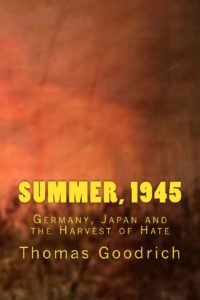Prologue:
Germany must perish
It is a cool, overcast day. It is an April day so typical in southern Germany, not quite winter, not quite spring.
They stand painfully, unbearably alone against a gray wall, under a gray Bavarian sky. Two of the three have their arms held high, facing the camera. The arms of these two are raised in such a way as to suggest that they have either been held in that position for a very long time or that they are now simply arms resigned to their fate. The other soldier has folded his arms quietly over his stomach. Perhaps he is sick. Perhaps he is wounded. Perhaps, like the others, he too simply does not care any longer.
They are all young; perhaps 17, or younger. At their feet, laying in piles up and down the line, there lay the others. Some are dead. Some, agonizing in their own blood, are yet alive. Others, no doubt, are uninjured but there they lay, unmoving, feigning death, eyes shut tight, brains pounding hard, minds screaming loud, “Why? Why? Why?” The machine-gun facing those on the ground and those yet standing is now being reloaded.
The three boys still standing are terrified. In all likelihood, one or all have lost control from fear and have urinated on themselves. Hearts are beating three times their normal rate. The pounding throb in each boy’s temples is so loud that it drowns out all other sound. Each face is pale. Each body is weak. Each mind is lost. Each boy is trying to make sense of it all. Such a thing as this cannot be happening. It is all a mistake. It surely is but a dream. Surely it is a nightmare from which they will soon awaken. Those soldiers facing them are Americans. They, like Germans, do not do such things. Each boy perhaps has a cousin or an uncle in America. They would not do such a thing.
Or perhaps the boys are beyond all this. Perhaps they know; know it is not a dream, but really happening to them. Perhaps they look to the left, then to the right, then down to their feet to see the red blood pouring in streams from those once their friends, their classmates, their cousins, even their brothers. Perhaps, as others about to die, perhaps their lives are already passing rapidly before their eyes—back to their childhoods, back to their teachers, back to their families, their pets, their girlfriends, back to the day when one of them nearly drowned in the lake and a British tourist saved him; or back to the pretty farm now turning from winter gray to spring green, the sweet smelling apple orchard now in bloom, the orchard he loved so much, just as his parents had, just as his grandparents had, just as their parents had.
Or perhaps the young men imagine that it was a miracle; when all else were shot by the machine-gun and died, God had sent them a miracle; a message from heaven that they would live. What else could have saved them when so many hundreds had died? Who else but God could have spared them?
We will never know what the boys were thinking as they stood alone in a sea of the dead. In a moment, the machine-gun will be reloaded and the Americans, laughing, shouting, staring at the young men with eyes of sadistic hate will then shoot them down.
